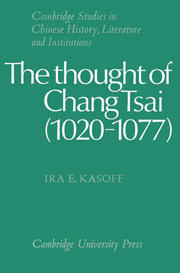Summary
The Philosophy of Chang Tsai
I have tried to demonstrate that Chang Tsai was a systematic thinker who developed a philosophy which refuted Buddhist theories and which allowed him to ‘string it all on one thread,’ and thus make clear again ‘the Way of Confucius and the Duke of Chou.’ This involved several things: his system had to affirm the reality of the physical world, the realm of heaven-and-earth; it had to explain all phenomena in the cosmos with one set of principles; it had to be able to show that the words of the various Classics were all talking about the one Way; it had to show that moral behavior was ‘natural’ – consistent with human nature – while accounting for the presence of evil in the world; and it had to do all of these things so that there was a coherence and consistency among them.
Chang developed such a philosophy from the Book of Change, particularly from the Hsi tz'u chuan. Written in cryptic, obscure language, the Hsi tz'u chuan formed the starting point for Chang's own system. The message that Chang drew from this text was that the ‘complementary bipolarity,’ in all its various aspects, accounts for all the phenomena of the world through its interactions. For example, Chang took literally the Hsi tz'u chuan phrase, ‘The alternation of yin and yang is what is meant by the Way,’ a line that was to become the source of much debate among later Tao hsüeh thinkers. Chang combined this idea that the alternation of yin and yang is the Way with his reformulation of the concept of qi to develop his theory of heaven-and-earth.
- Type
- Chapter
- Information
- The Thought of Chang Tsai (1020–1077) , pp. 125 - 147Publisher: Cambridge University PressPrint publication year: 1984

